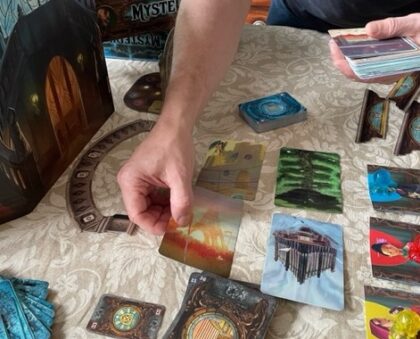One of our favorite cooperative board games is called Mysterium. It’s an asymmetrical game, which means that one player has a specialized role distinct from the other players. In the case of Mysterium, one player is the Ghost, while the other players are the Psychics trying to piece together a murder from abstract Vision cards.
Even though everyone is cooperating, the Ghosts and the Psychics have different roles and limitations. Each round, the Ghost provides artistic Vision cards to each of the Psychics, but can’t communicate with them in any other way. The Psychics can talk with one another and help each connect the abstract images with a particular culprit, location, and weapon.
The role of the Ghost can seem intimidating to new players. You’re kind of on your own, and you’re really limited in what you can communicate. Since I’m familiar with the game, I usually volunteer to play the role of Ghost when introducing people to Mysterium for the first time. This was the case recently when we played with a couple of friends.
It takes less than an hour to play Mysterium, so when we finished our first game, I asked, “What do you think? Want to play again?”
The answer was a resounding Yes! So, I followed up by asking, “Who wants to be the Ghost this time? I’ll walk you through each step.”
One of our friends said, “You’re doing so well at it, and you already know what you’re doing. You should keep being the Ghost!” To which I smiled and politely declined.
In a collaborative community, whether it’s a community of six or a community of 300, it seems natural for us to let people keep doing what they’re already doing well. We might think, “Well, that job’s handled. No reason to worry about that getting done.” Maybe it’s because we don’t want to step on someone’s toes. Maybe it’s because we’re a little bit lazy. Maybe it’s because we don’t think very highly of ourselves and our capability. It could be a lot of things.
The truth is, even though I’m good at being the Ghost in a game of Mysterium, I also enjoy being one of the Psychics. But if I didn’t insist on someone else giving it a try, I might wind up playing the Ghost in every game.
When we see someone doing something really well in our community, we could take the initiative and ask them to teach us how to do that thing. Chances are, they’d appreciate having the opportunity to play a different role once in a while. It doesn’t mean that they aren’t great at doing whatever it is they’re doing. It just means that we could all share in the fun of co-creating Beloved Community.
And even when we’re really good at something, we might look around the room and invite someone else to give it a try. We can say, “I’ll walk you through it,” so they have some guidance. That way, we get to take a breather once in a while and trust that others will keep things going.
To get the full experience of Mysterium—to really understand the game well—I have to spend time on both sides of the collaboration. Just experiencing it as a Psychic doesn’t give me a full appreciation of how the game flows. And just playing the Ghost doesn’t give me the opportunity to experience other people’s way of thinking.
Could it be that a really well-played game of Congregation works the same way?
Share this post:
